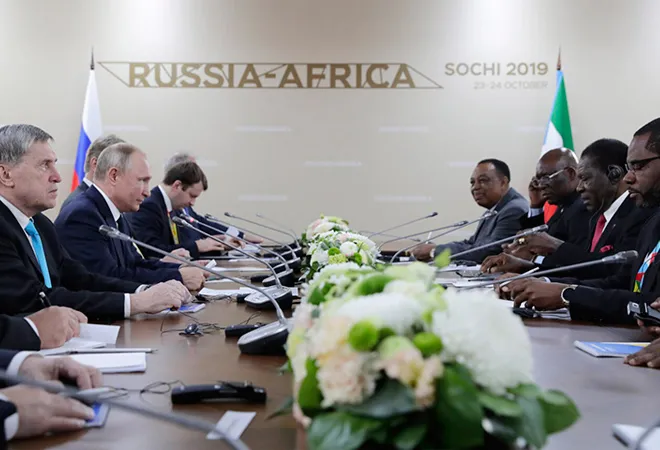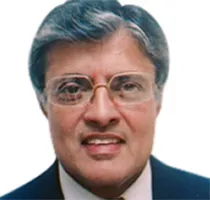
Two events within a period of one week in late October 2019 put Russia squarely back on the global scene as a major player. The first was the Agreement between Putin and Erdogan of Turkey, which led to a new configuration of forces in Northern Syria making Putin a master strategist and the most influential stakeholder in the Middle East for the time being. The second was a well-publicized Russia-Africa Summit on October 23 and 24 at Sochi. It was the first of its kind with participation by representatives from all the 54 countries of Africa (43 of them at the Head of State or Head of Government level) and 3000 Business and other delegates. President Putin called it “unprecedented”. He also said,”our cooperation, rooted in the period of the joint fight against colonialism, is strategic and long standing.”
Not a sudden development
The Summit was, by no means, a sudden Russian decision. Many African states had excellent relations with the former Soviet Union during the Cold War days. USSR supported them in their liberation struggles and later helped the nascent states with financial and security support. This was to influence them ideologically and counter the moves by the US and Western Powers. With the collapse of USSR in 1991, Africa was a neglected area for Russia in the 1990s. There was a change in this situation in the new millennium with, on the one hand, Putin coming to power and, on the other, the resurgence of Africa. Given Putin’s global leadership ambitions, it was only a matter of time before Russia started engaging Africa in a significant way. The real change came in 2014 when Russia started facing US led sanctions following its annexation of Crimea. She needed new markets and business partners. Russia was also aware that all major powers and emerging economies had a notable presence in Africa, which by then had become the fastest growing continent on the globe with a population of 1.2 billion, huge work force and an economy of US$ 9 trillion by 2050.
Russia has already been active in the Continent in the last four to five years. In the Security sector, Russia has helped in the stabilization of the situation in Central African Republic where a Russian Security Company, the Wagner Group is active. In Libya and Mozambique, Russian contractors are supporting the Governments. In 2014, Russia was able to beat both UK and US in supplying arms to Nigeria to fight Boko Haram. Russia has signed military arrangements with almost two dozen countries in Africa. However, its actual presence on the ground is small compared to those of France or the US.
Scramble for Africa?
Some analysts have projected Russia’s initiative as another step in the so-called scramble for Africa. This betrays a mind-set of the 1885 Berlin Conference, where the colonial powers divided Africa among themselves. However, Africa of today is not the same as the one in 1885. It is a confident continent capable of handling many partners and leveraging them for its strategic interests. The 2063 Africa Vision Document and the recent African Continental Free Trade Agreement (AfCFTA) reflect this confidence. Russia offers yet another choice for the African countries for meaningful cooperation.
For Russia, the Summit was more than just trade and investments. Russia-Africa bilateral trade, which doubled in the last five years stands today at about US$20 billion. This is miniscule compared to other partners like China, US, Europe, India and Japan, Only 3.7% of Russian exports end up in Africa with 2.7% going to North Africa. African goods account for only 1.1% of Russian imports. Putin announced at the Summit that trade would be doubled in the next four or five years. This may not be realistic. Trade in mineral resources particularly manganese and chromium will be very important for Russia.
However, the partnerships in other sectors are set to boom particularly in areas of Russian strength. These will be in sale of arms, security, oil and gas sectors, Nuclear energy, mining and diamond industry. On the eve of the Summit, Rwanda approved a deal signed in December 2018 on nuclear energy cooperation.
Russia is the main arms supplier to the continent. According to the Stockholm International Peace Research Institute (SIPRI), between 2014 and 2018, Russia accounted for 49% of arms imports into North Africa and 28% of the imports in sub-Saharan Africa.
Take aways from the Summit
The Egyptian President, Abdel Fattah al-Sisi was the Co-chair for the Summit. On the sidelines, Putin had as many as thirteen bilateral meetings with the African leaders. Deals worth US$12.5 billion were signed in the form of Memoranda of Understanding (MOU). Not all of them may materialize. The deals included attack helicopters for Nigeria, nuclear power plant in Ethiopia, oil and gas cooperation in the Democratic Republic of Congo, Equatorial Guinea, Morocco and Sudan. Debts of various countries totaling over US$ 20 billion were written off. There are plans to sell weapons worth US$ 4 billion in 2019. A logistics center is to be established in Eritrea.
On the Human Resources sector, Russia will increase the number of scholarships and research supports for African students. At present there are about 15,000 young Africans studying in Russia, mainly from Nigeria, Angola, Morocco, Namibia and Tunisia.
Summit Declaration
The Summit came up with a final Declaration of 47 paras dealing with the mechanisms of Partnership, Political Cooperation, Security Cooperation, Trade and Economic Cooperation, Scientific, Technical, Humanitarian and Information Cooperation and Cooperation in Environmental Protection. In a veiled criticism of the US, there were references to “opposition to the revision of the universally recognized principles and norms of international law” and the “adoption of unilateral measures”. Para 30 is more specific where it talks of “political dictatorship and financial blackmail in international trade”.
Such Summits will be convened once every three years. There will be annual political consultations at the levels of Foreign Ministers along with the present, former and future Presidencies of the African Union.
The views expressed above belong to the author(s). ORF research and analyses now available on Telegram! Click here to access our curated content — blogs, longforms and interviews.




 PREV
PREV


